The Apple iPad Air 2 Review
by Joshua Ho on November 7, 2014 9:30 AM EST- Posted in
- Tablets
- Apple
- Mobile
- iOS
- ipad Air 2
Battery Life
With the move from featurephones to smartphones, battery life has been and continues to be a critical issue. While it wasn’t unusual to see a week or more of battery life on a featurephone, some of the earliest smartphones couldn’t even last a day. While tablets seem to have a much easier time achieving high levels of battery life by virtue of massively increased volume, they still face similar issues as they are often used for gaming or other more intensive workloads that a smartphone is unlikely to see nearly as often. In order to test this, we run our tablets through a standard suite of tests of various use cases. In all cases where the display is on, all displays are calibrated to a brightness of 200 nits to draw useful relative comparisons.
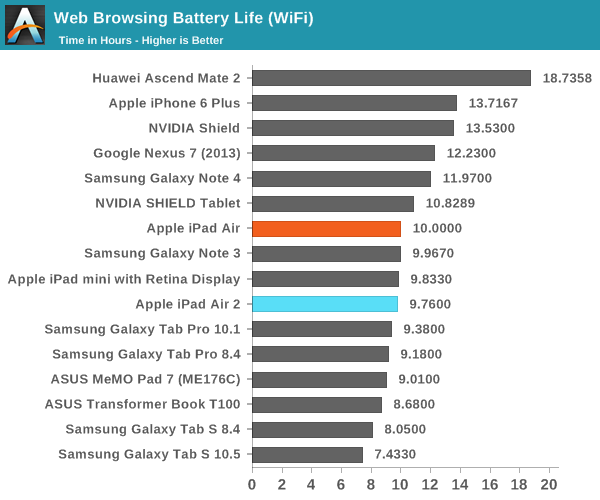
In our first test, we see that the iPad Air 2 is about roughly equivalent to the original iPad Air for WiFi web browsing. This is actually a bit surprising as the battery in the iPad Air 2 is approximately 84% of the iPad Air. This would mean that we would expect the iPad Air 2 to get around 8.4 hours of battery life in this test, which represents a 16% gain to efficiency. It’s likely that these improvements to battery life come from the new process node on the A8X, along with the newer WiFi module.
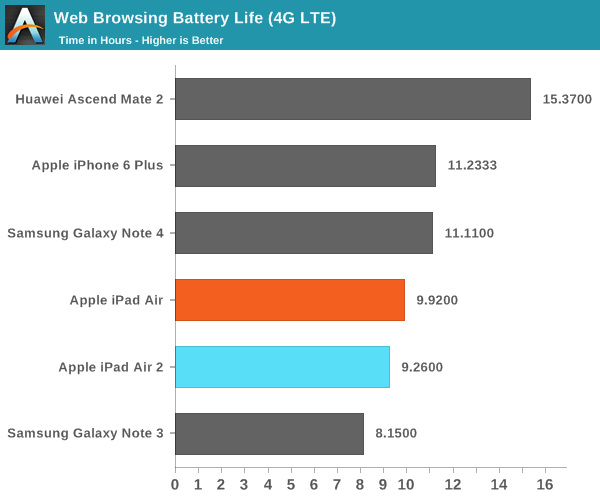
Along the same lines, the LTE web browsing test tracks quite closely but it seems that there’s a minor decrease in efficiency gains when compared to WiFi. This difference is likely to be explained by the much higher bandwidth available in WiFi when compared to LTE.
While the web browsing tests are effective at ensuring faster SoCs aren’t punished, this inherently tilts battery life towards a more display-bound mode rather than compute-bound. Unfortunately short of a jailbreak it doesn’t seem possible to get an effective Basemark OS II battery test, so we’re mostly limited to a test of GFXBench’s unlimited rundown.
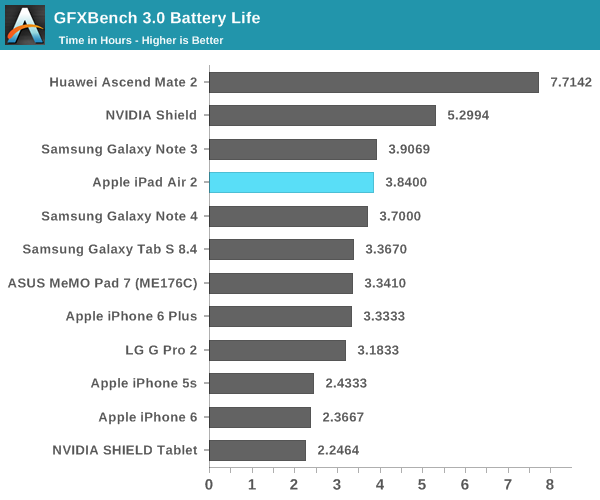
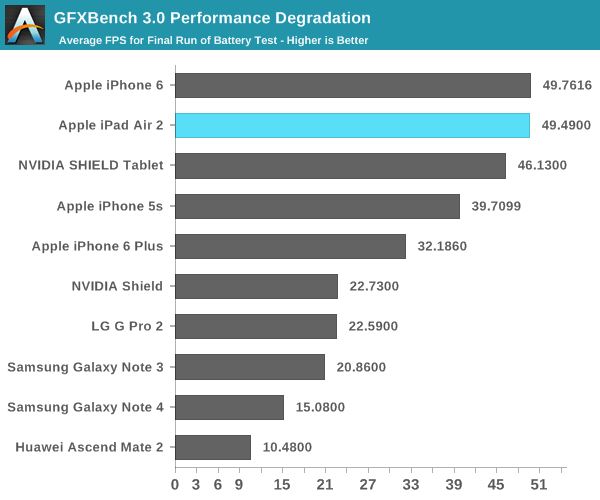
As one can see, the iPad Air 2 is one of the best performers on this test, considering its frame rate and runtime. While NVIDIA's GK20A GPU in Tegra K1 can get close to the GX6650 for short periods of time, over a long workload it's pretty clear that the GX6650 on 20nm has better sustained performance and significantly superior efficiency as it doesn't throttle until the 200th iteration of the test. It's important to note that the iPad Air 2 is running at a higher native resolution here, so relative to SHIELD Tablet a scaling factor needs to be estimated in order to get an idea for performance at the same resolution. During this test I saw that the skin temperatures never exceeded 45C, so this isn't the result of Apple choosing to run the device hotter than most.
Charge Time
While tablets deliver some great battery life in general, charge time tends to be much slower than that of smartphones as the battery is much larger and charging the device isn't as time critical due to the longer battery life . While we can't quite cover the full range of battery life uses cases, it's important to remember that in cases where the platform is otherwise identical beyond display that battery life scales linearly with overall capacity. In order to test charge time, we measure the time it takes for the battery to reach 100% from a fully-depleted state.
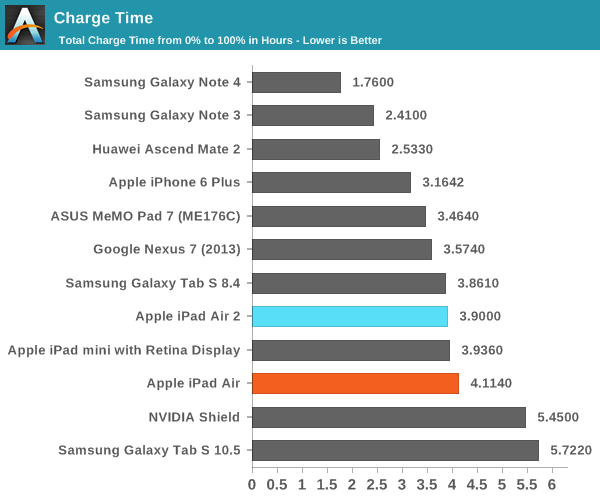
As one can see, the smaller battery seems to have a noticeable impact on charge time, although the difference isn't really all that notable as the difference is only around ten minutes at the end of the day.


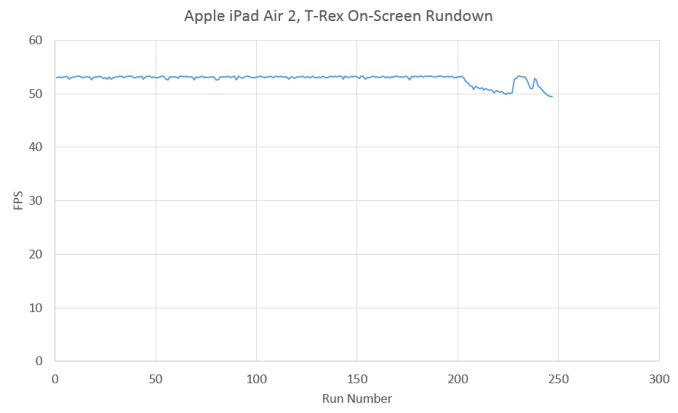








226 Comments
View All Comments
Sushisamurai - Friday, November 7, 2014 - link
I know right? It's actually really annoying, it's practically forced me to prop it up when using it for TV/movies because holding a vibrating tablet for 40 minutes was a huge pain the in the ass. I'd rather they keep the same size as the iPad Air 1, and just give me 2-4 more hours of use time (by keeping the battery size the same, increased efficiency of A8X) and NO VIBRATING tablet.Sushisamurai - Friday, November 7, 2014 - link
No, my iPad Air 2 does not reproduce this issue, even with full strength one finger push (erred on the side of not bending my iPad). However, I do have a hard plastic back case (thin) on it - applying pressure to the screen also does not produce any issues.Georges003 - Saturday, November 8, 2014 - link
I am apparently not the only one who has noticed this effect on the Air 2. See:http://www.consumerreports.org/cro/news/2014/10/ha...
http://forums.macrumors.com/showthread.php?t=18089...
hammer256 - Friday, November 7, 2014 - link
I recall it was said that Nvidia was not going to use the TSMC 20nm because it's only really ready for SoC production, perhaps because the yield is not good enough for large dies yet? But if the 20nm process can already produce chips with 3 billion transistors at presumably acceptable yield, that is well into the GPU transistor count territory.I just wonder if this holds any indication/promise that Nvidia and AMD could move to 20nm in a relatively quick time frame, say within the next year. 28nm is really getting long in the tooth. Well, at least I imagine Nvidia's next SoC should be on 20nm...
rUmX - Friday, November 7, 2014 - link
It's about volume and Apple bought most if not all of it.kron123456789 - Friday, November 7, 2014 - link
We'll see in 2 months, at CES 2015))It should be the beast)mabellon - Friday, November 7, 2014 - link
Great article Joshua,I was a little disappointed that there was no comparison against the Surface Pro 3. I am not interested in any OS/fanboy wars by any means - purely a hardware comparison. The Geekbench scores for the iPad Air 2 are (1798/4468) as shown in your article. The Geekbench scores for the entry level 1.5Ghz Core i3 Surface Pro 3 are (1569/3137) on a $280 CPU! But that's only one benchmark of course. GPU is certainly a very different beast all together as well.
I would love to see some comprehensive testing to compare ARM (especially the A8X, and 64bit K1) against Intel's offerings. The slower clocked Celerons and Core i3s are the most comparable as those laptops are closer to tablet pricing. The Core M series is coming and its clocked even slower (but has turbo) -it's fanless performance remains to be seen. Ultimately the question is... how close is ARM to truly competing with Intel in the laptop space?
And some food for thought... If a 1.5Ghz A8X is already in striking distance of Intel's low end 1.5Ghz... what would happen if Apple added turbo/higher clocks and a fan?
Impulses - Friday, November 7, 2014 - link
It's all very interesting from a technical curiosity standpoint, but until mobile OS evolve a lot more there aren't gonna be very many people cross shopping anything running iOS (or Android) vs a Surface Pro... And no one wants a Windows system running ARM hardware cause it defeats the point of running Windows.I guess the one exception to all that would be if Apple were working on OS X ARM edition...
mabellon - Friday, November 7, 2014 - link
Agreed. Very much an intellectual curiosity. Windows on ARM defeats the purpose of running Windows. Mobile OSes are not capable of fully replacing a desktop environment for productivity.Apple *could* push out an OSX ARM edition. It would be very interesting to see if they have the clout to get devs on board such a port. Maybe? Maybe it just pushes Intel to improve.
The only ARM product likely to matter in the short term for laptop compete is the Chromebook. Still not feature competitive, but if performance really is encroaching on Intel and price is cheaper, it will at least force Intel to compete on price/perf on the low end.
Aside: I also remembered AT's Surface Pro 3 review with the Core i3. Google Octane 11,600 vs 9,400 gives Intel the edge but the gap is closing fast.
kron123456789 - Friday, November 7, 2014 - link
iOS is OS X ARM ediition, lol.